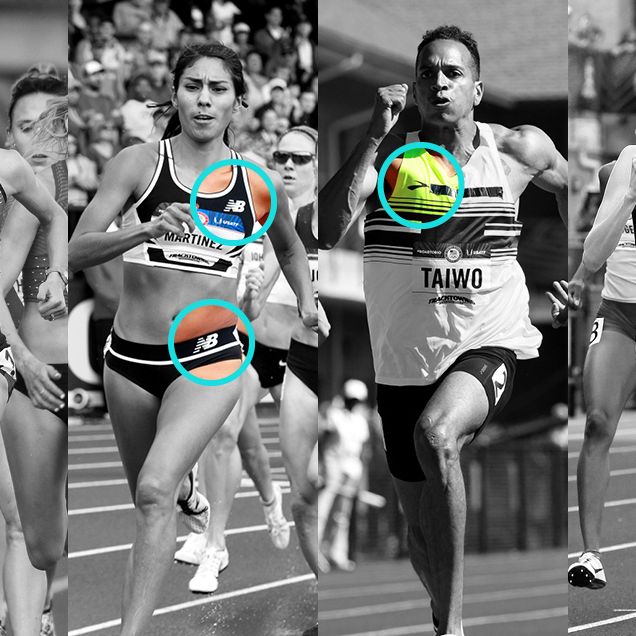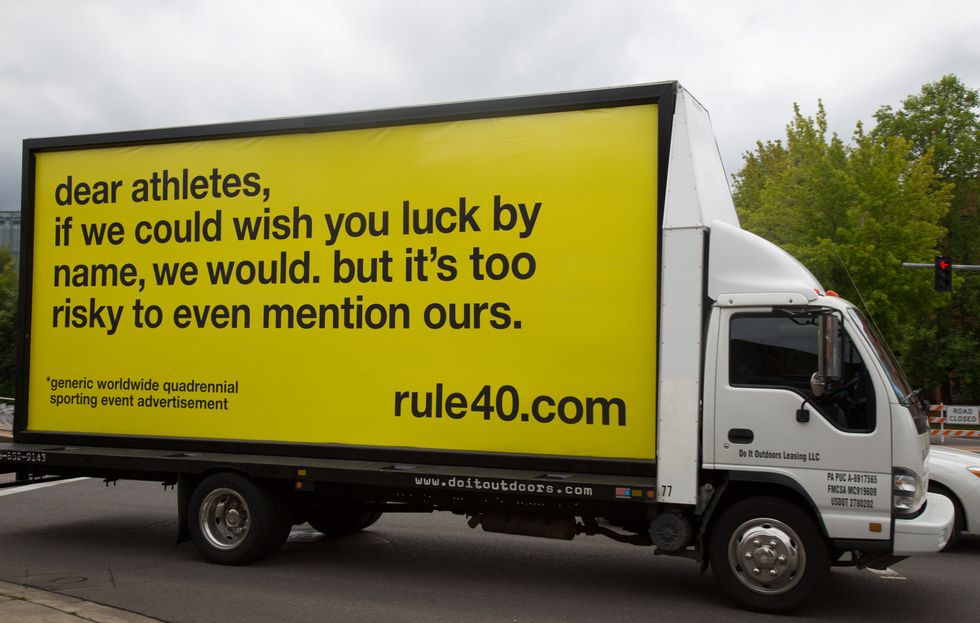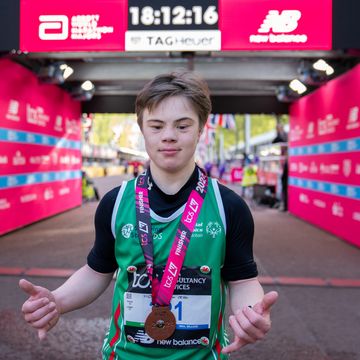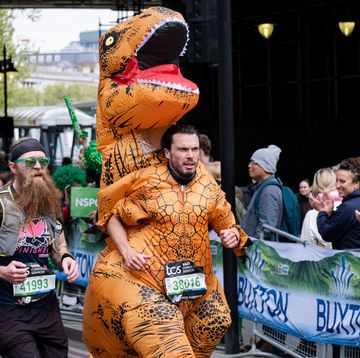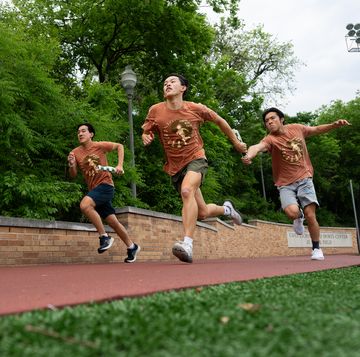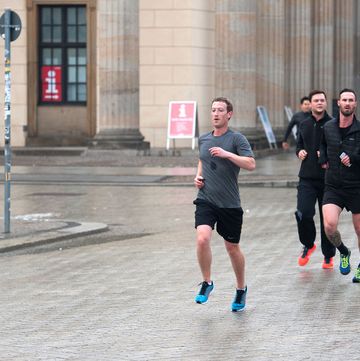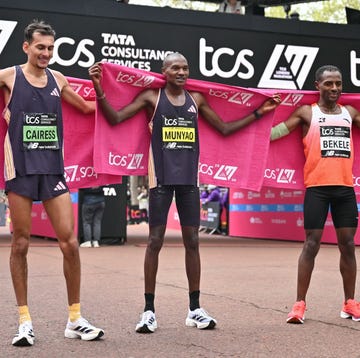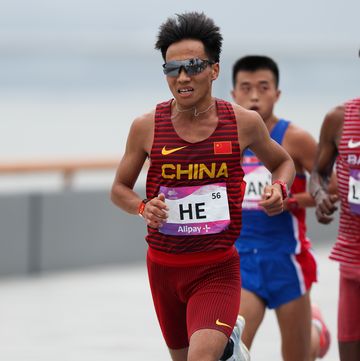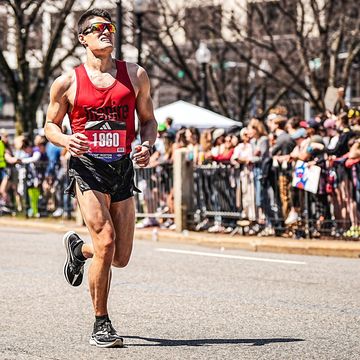Craig Leon, MBA program manager for the University of Oregon’s Warsaw Sports Marketing Center, gets it. Companies pay more than $100 million to become official sponsors of the Olympic Games, so of course the International Olympic Committee (IOC) needs to protect the investments those corporate partners make.
But Leon is also a professional athlete, a marathoner who finished eighth in the 2015 New York City Marathon and competed in February in the Olympic Marathon Trials.
So he understands the other side of a controversy: why athletes and the non-Olympic partner companies who sponsor them are angry that the IOC limits their ability to run advertising campaigns and use social media to celebrate successes and capitalize financially.
“I see it from both sides—I live it every day from both sides,” Leon said. “It’s a convoluted space right now.”
He’s referring to Rule 40, a policy designed to protect the rights of Olympic sponsors. For the money these brands pay, they are allowed to use trademarked Olympic terms, phrases, and images in their advertising. But for companies that are not official Olympic partners, certain phrases are banned, like “Olympic,” “Rio,” “Gold,” or “Games,” for example.
During a blackout period between July 27 and August 24, these non-Olympic sponsors, some of which may support athletes at the Games, also may not wish these individuals luck or congratulations on social media or in other marketing collateral.
Athletes protested Rule 40, which is designed to protect Olympic sponsors from ambush marketing, during the 2012 London Games. And although the IOC has relaxed the rule in its most recent guidelines for the 2016 Rio de Janeiro Games, there is still much discontent—and confusion.
“Imagine that a company wouldn’t be able to congratulate one of its athletes for winning the World Series or the Super Bowl,” said John Grady, J.D., Ph.D., associate professor of sport and entertainment management at the University of South Carolina. “Or, for example, would Under Armour not be able to congratulate Jordan Spieth for winning the Masters because Under Armour is not a sponsor at the Masters? Of course not.”
Athlete rights
The world of Olympic sponsorship, however, is different from typical sporting events. The Games, still influenced by the ideals of amateurism promoted in the late 1800s by Pierre de Coubertin, prohibit marketing within the venues, eliminating a revenue stream. More than 40 percent of Olympic revenues come from corporate sponsorships.
“I understand and I am empathetic to athletes and their individual deals and what they’re trying to do,” said Whitney Wagoner, director of Oregon’s Warsaw Sports Marketing Center. “But it is not a minor piece of this to protect the value of IOC rights. That money flows back to IOC member nations. That money flows back to local organizing committees so they can build the venues. It’s an important revenue stream for the entire ecosystem.”
But protecting that revenue stream is about more than tweets or the ad campaigns. The controversy touches on complex questions: How possible is it to police social media? What’s the definition of advertising in the internet age? Who controls an athlete’s likeness or words?
The argument is playing out over social media, with prominent voices such as 800-meter runner Nick Symmonds taking to Twitter to blast the IOC for not directing any of its vast revenues to Olympic athletes and Oiselle founder and CEO Sally Bergesen blogging about how unfair Rule 40 is for a smaller company such as hers—and for the athletes, particularly in sports that get the spotlight only every fourth year.
“It’s devastating,” Bergesen said. “For the athletes themselves, they may make an Olympic team and essentially not get any pay for it unless their sponsor has a bonus system. And what’s in it for the sponsor if they don’t get any visibility? It’s basically out of the goodness of your heart as a sponsor, but there’s very little return.”
Oiselle sponsors three athletes competing in Rio, including Kate Grace, the 800-meter Olympic Trials champion.
The controversy is also playing out during a time of heightened awareness for athletes’ rights. For example, group of Northwestern University football players attempted to unionize last fall, wanting a say in issues such as safety and health care, especially because none of college football’s vast revenues go directly to athletes. Former UCLA basketball player Ed O’Bannon’s lawsuit against the NCAA maintains that the governing body is violating antitrust law by not allowing athletes to be paid when their names or images are used in video games and the like.
“You have a growing wave of athletes who are vocal about seeking more fairness when their performance is being used to make someone else money,” Grady said.
Professional athletes in U.S. leagues don’t have this issue, but there is no union for Olympic athletes.
“I always call track and field a semiprofessional sport,” Symmonds said. “It is by no means a professional sport. The main reason for these issues is that we are still trying to shrug off this amateur state.”
All of which factors into the current controversy.
Antiquated rules?
Rule 40 is part of the Olympic charter, a 110-page document that does everything from defining the soaring principle of Olympism (“A philosophy of life, exalting and combining in a balanced whole the qualities of body, will and mind”) to providing nitty-gritty details for eligibility to compete.
Rule 40 lays out the conditions for participation, including this: “Except as permitted by the IOC Executive Board, no competitor, coach, trainer or official who participates in the Olympic Games may allow his person, name, picture or sports performances to be used for advertising purposes during the Olympic Games.”
Violations of Rule 40 have popped up from time to time. In 2002, an agent for snowboarder Danny Kass was told the night before the halfpipe final that unless a poster of him was removed from a Quiksilver store in Park City, Utah, Kass could not compete. In 2010, snowboarder Shaun White’s likeness had to be blacked out of a Target ad in Times Square because the retailer wasn’t an Olympic partner.
At the 2012 London Games, the rule became a full-fledged controversy when athletes took to social media, saying that the IOC’s efforts to protect its official sponsors were restricting their ability to reward current sponsors and attract new ones. The hashtag #WeDemandChange took off, with high-profile track athletes such as Symmonds, Dawn Harper-Nelson, and Sanya Richards-Ross leading the way.
“With as much outcry and backlash as there was,” Leon said, “I thought we would get to this point where individual athletes would have an opportunity to in some way play in that digital space and acknowledge their relationships with sponsors. But it’s really gotten kind of bizarre.”
In 2015, the IOC announced changes that would relax the Rule 40 restrictions. A five-page document does allow a path for non-Olympic sponsors to advertise during the blackout period, but it includes rigid rules: waiver applications due months before Olympic teams are chosen and a requirement to begin running the approved advertisements by March 27, 2016.
Unchanged was the “list of inadmissible practices,” which includes using 20 words and phrases that are forbidden, including Olympics, gold, silver, bronze, medal, effort, performance, and victory.
Many find the restrictions absurd when they are applied to social media, in particular—for brands or for athletes.
Leon painted a scenario. Say a bakery in Eugene, Oregon, a city known for an enthusiastic track fan base, gets excited about an event in Rio and tweets, “Go Team USA, way to win the gold!”
“In theory,” Leon said, “that’s breaking the rules.”
Multiply that by other bakeries in other towns, and other businesses in other towns. Is it possible for the IOC to stop this?
“I think they’re going to find in the next three to six months that Rule 40 is totally unenforceable in today’s digital age,” Symmonds said.
Bergesen agreed: “I think it is going to get embarrassing for them, and I think the true embarrassment is going to be the lack of pay—the lack of pay and the lack of humanity allowing athletes to fully experience and share their Olympic moment.”
Leon suspects that enforcement will come not from the IOC or USOC, but from the official Olympic sponsors, who will point out if a competitor is infringing on the privilege for which they paid handsomely.
Rule 40 does not spell out punishment for those who violate it. The Olympic Charter’s Rule 59 does lay out disciplinary procedures for any violations: loss of credentials, disqualification, medals revoked.
“What I’ve found from the governing bodies, oftentimes legally they have no leg to stand on,” Symmonds said. “But they’ll use bullying tactics.”
Would the IOC or USOC send an athlete who tweets about the Road to Rio or thanks a sponsor during the blackout period home? It remains to be seen.
“The classic ambush marketing is the people who put up signs on the way to the venue that use the prohibited rules,” said Michael Straubel, a Valparaiso University professor who specializes in sports law (and coaches the men’s and women’s cross-country teams). “Some of this isn’t blatant like that—it’s not obvious. It’s more coincidental. Is that really advertising purposes? If I had to defend an athlete like that, that’s the first thing I’d zero in on: the intent for advertising purposes and whether there is harm. If there’s no harm, where’s the foul?”
Creatively skirting the policy
Under the relaxed rules, some companies have designed ad campaigns that simply allude to the Olympics—Under Armour’s Rule Yourself campaign, which focuses on the intense training and sacrifices athletes endure, is one such example. One highly acclaimed ad focuses on 18-time gold medalist Michael Phelps.
“With Michael Phelps, you don’t need to make an Olympic connection,” Grady said. “Showing Michael Phelps training for anything four months before means he’s going to Rio. If that’s what the relaxed Rule 40 was supposed to be, then the ambushers are clearly winning.”
And while the rule does affect the big names and companies, it is the lesser-known companies and contract opportunities for athletes that could suffer. “If you can’t capitalize on that at all, what’s the incentive for a small or mid-sized company to invest any money at all?” Leon said. “It really is a charity thing at that point.”
The question remains: Is this a productive position for the IOC? Leon said demographics indicate the average age of Olympics fans is rising and limiting opportunities on social media may not be a way to draw new fans in.
“So they’re not doing themselves any favors by then basically trying to outlaw all digital, social-media type of media engagement,” he said. “That’s where all the people under the age of 30 would like to consume their media.”
Restrictions don’t necessarily help the product, Straubel agreed.
“You wonder—has the IOC looked closely enough at this to figure out whether they truly are hurting their revenue sources?” Straubel asked. “It seems as though they could make broader exceptions and at least not hurt their sponsors and revenue sources—actually drive more traffic to them.”
Leon, for one, said it may help that athletes will be able to react in Rio not from anger, as many did in London, but with the knowledge they’ve gained in the months leading up to the Games.
Already, a Rule40 advertising campaign has developed, though it is unclear whom, exactly, is behind it. Rule40.com site offers cheeky ways for fans, sponsors, and other to skirt the rules by using premade posts for social media that cleverly put into light how extreme the word restrictions are. “Good luck, you know who you are, on making it you know where,” one says. On July 26, the day before the Rule 40 period began, many athletes bound for Rio took to Twitter to thank their sponsors.
“I certainly hope that people continue to push the envelope,” Leon said.
